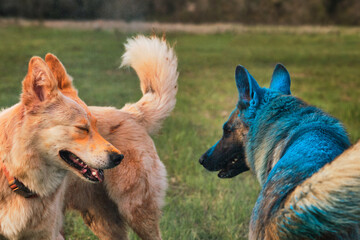Introduction
The German Shepherd breed is renowned for its intelligence, loyalty, and versatility. However, there’s a lingering question that often arises among dog enthusiasts: Are blue German Shepherds real? In this comprehensive guide, we’ll delve into the origins, characteristics, and controversies surrounding blue dogs By the end, you’ll have a clear understanding of whether these unique dogs truly exist and what makes them distinct from their traditional counterparts.
Table of Contents
Understanding German Shepherd Genetics
Coat Color Genetics German Shepherd

Before we dive into the specifics of blue German Shepherds, it’s essential to understand the basics of coat color genetics in dogs. The coat color of a dogs is determined by a combination of genes inherited from its parents. These genes control the production of melanin, which gives the coat its color.
Traditional Coat Colors
The most common coat colors in German Shepherds are black and tan, sable, and solid black. These colors are considered standard for the breed and are recognized by major kennel clubs worldwide.
The Controversy Surrounding
What Are
Blue German Shepherds are a rare variation of the breed characterized by a blue or grayish coat. While traditional have black, tan, or sable coats, Shepherds have a unique coloration that sets them apart.
Are They Purebred?
One of the main points of contention surrounding blue dog is their purity as a breed. Some argue that these dogs are not purebred German Shepherds but rather a result of crossbreeding with other breeds to achieve the blue coloration. However, others maintain that blue Shepherds can be purebred if they have a lineage that traces back to reputable breeders and bloodlines.

Debunking Myths About dogs
Myth: Blue German Shepherds are a Separate Breed
Contrary to popular belief, blue German are not a separate breed but rather a color variation within the Shepherd breed. They possess all the characteristics and traits of traditional Shepherds, including intelligence, loyalty, and trainability.
Myth: Blue dogs Have Health Issues
While it’s true that some blue-coated dogs in other breeds may be prone to certain health issues, there is no evidence to suggest that blue Shepherds are inherently less healthy than their traditional counterparts. Like all dogs, they may be susceptible to certain genetic conditions, but coat color alone is not indicative of health problems.
The Genetics of Blue Coats in
Dilution Gene
The blue coloration in German Shepherds is caused by a dilution gene that affects the production of melanin in the hair shaft. This gene results in a lighter, grayish-blue coat coloration that is distinct from the traditional black and tan or sable coats.
Inheritance Patterns

The dilution gene responsible for blue coat coloration in German is inherited in a recessive manner. This means that both parents must carry the gene for it to be expressed in their offspring. Therefore, breeding two blue Germandogs together increases the likelihood of producing blue-coated puppies.
Recognizing
Coat Color
The most distinguishing feature of blue German Shepherds is their unique coat coloration. Instead of the traditional black and tan or sable coats, these dogs have a striking blue or grayish hue that sets them apart from other German dogs.
Other Characteristics
In addition to their distinctive coat color, blue German exhibit all the traits and characteristics typical of the breed. They are intelligent, loyal, and highly trainable, making them excellent companions and working dogs.
Conclusion
So, are blue German Shepherds real? The answer is yes. While they may be less common than traditional black and tan or sable dogs do exist and are recognized as a legitimate variation of the breed. Whether you’re drawn to their unique coat color or their exceptional qualities as working dogs, are a fascinating aspect of the breed’s diversity.
For more information on nd the genetics behind coat color variations in dogs, consult reputable resources such as The German Shepherd Dog Club of America and The American Kennel Club.





























































